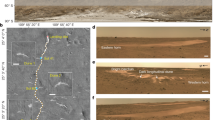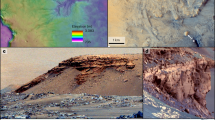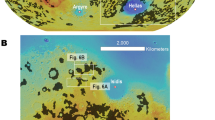Abstract
A key pacemaker of ice ages on the Earth is climatic forcing due to variations in planetary orbital parameters. Recent Mars exploration has revealed dusty, water-ice-rich mantling deposits that are layered, metres thick and latitude dependent, occurring in both hemispheres from mid-latitudes to the poles. Here we show evidence that these deposits formed during a geologically recent ice age that occurred from about 2.1 to 0.4 Myr ago. The deposits were emplaced symmetrically down to latitudes of ∼30°—equivalent to Saudi Arabia and the southern United States on the Earth—in response to the changing stability of water ice and dust during variations in obliquity (the angle between Mars' pole of rotation and the ecliptic plane) reaching 30–35°. Mars is at present in an ‘interglacial’ period, and the ice-rich deposits are undergoing reworking, degradation and retreat in response to the current instability of near-surface ice. Unlike the Earth, martian ice ages are characterized by warmer polar climates and enhanced equatorward transport of atmospheric water and dust to produce widespread smooth deposits down to mid-latitudes.
This is a preview of subscription content, access via your institution
Access options
Subscribe to this journal
Receive 51 print issues and online access
$199.00 per year
only $3.90 per issue
Buy this article
- Purchase on SpringerLink
- Instant access to full article PDF
Prices may be subject to local taxes which are calculated during checkout




Similar content being viewed by others
References
Imbrie, J. & Imbrie, K. P. Ice Ages: Solving the Mystery (Harvard Univ. Press, Cambridge, MA, 1986)
Zachos, J. et al. Trends, rhythms, and aberrations in global climate 65 Ma to present. Science 292, 686–693 (2001)
Touma, J. & Wisdom, J. The chaotic obliquity of Mars. Science 259, 1294–1297 (1993)
Laskar, J. & Robutel, P. The chaotic obliquity of the planets. Nature 362, 608–612 (1993)
Laskar, J. et al. Orbital forcing of the martian polar layered deposits. Nature 419, 375–377 (2002)
Ward, W. R. in Mars (eds Kieffer, H. H. et al. ) 298–320 (Univ. Arizona Press, Tucson, AZ, 1992)
Kieffer, H. H. & Zent, A. P. in Mars (eds Kieffer, H. H. et al.) 1180–1218 (Univ. Arizona Press, Tucson, AZ, 1992)
Fanale, F. P. et al. in Mars (eds Kieffer, H. H. et al.) 1135–1179 (Univ. Arizona Press, Tucson, AZ, 1992)
Thomas, P. et al. in Mars (eds Kieffer, H. H. et al.) 767–795 (Univ. Arizona Press, Tucson, AZ, 1992)
Mellon, M. T. & Jakosky, B. M. The distribution and behavior of Martian ground ice during past and present epochs. J. Geophys. Res. 100, 11781–11799 (1995)
Squyres, S. W. et al. in Mars (eds Kieffer, H. H. et al.) 523–554 (Univ. Arizona Press, Tucson, AZ, 1992)
Kreslavsky, M. A. & Head, J. W. Kilometre-scale roughness of Mars: Results from MOLA data analysis. J. Geophys. Res. 105, 26695–26711 (2000)
Kreslavsky, M. A. & Head, J. W. Mars: Nature and evolution of young latitude-dependent water-ice-rich mantle. Geophys. Res. Lett. 29, doi:10.1029/2002GL015392 (2002)
Kreslavsky, M. A. & Head, J. W. Stratigraphy of young deposits in the northern circumpolar region, Mars. Lunar Planet. Sci. XXXIV, abstr. 1476 (2003)
Malin, M. C. & Edgett, K. S. Mars Global Surveyor Mars Orbiter Camera: Interplanetary cruise through primary mission. J. Geophys. Res. 106, 23429–23570 (2001)
Mustard, J. F. et al. Evidence for recent climate change on Mars from the identification of youthful near-surface ground ice. Nature 412, 411–414 (2001)
Seibert, N. M. & Kargel, J. S. Small-scale martian polygonal terrain: Implications for liquid surface water. Geophys. Res. Lett. 28, 899–903 (2001)
Mangold, M. et al. High latitude patterned grounds on Mars: Evidence for recent melting of near-surface ground ice. Lunar Planet. Sci. XXXIII, abstr. 1219 (2002)
Malin, M. C. & Edgett, K. S. Evidence for recent groundwater seepage and surface runoff on Mars. Science 288, 2330–2335 (2000)
Milliken, R. E. et al. Viscous flow features on the surface of Mars: Observations from high-resolution MOC images. J. Geophys. Res. 108, doi:10.1029/2002JE002005 (2003)
Cabrol, N. A. & Grin, E. A. The recent Mars global warming (MGW) and/or south pole advance (SPA) hypothesis: Global geological evidence and reasons why gullies could still be forming today. Lunar Planet. Sci. XXXIII, abstr. 1058 (2002)
Carr, M. H. Mars Global Surveyor observations of Martian fretted terrain. J. Geophys. Res. 106, 23571–23593 (2001)
Kostama, V.-P. et al. Morphology of the northern plains in the circumpolar region, Mars. Lunar Planet. Sci. XXXIV, abstr. 1340 (2003)
Costard, F. et al. Formation of recent martian debris flows by melting of near-surface ground ice at high obliquity. Science 295, 110–113 (2002)
Christensen, P. R. Formation of recent martian gullies through melting of extensive water-rich snow deposits. Nature 422, 45–48 (2003)
Hecht, M. H. Metastability of liquid water on Mars. Icarus 156, 373–386 (2002)
Boynton, W. V. et al. Distribution of hydrogen in the near-surface of Mars: Evidence for subsurface ice deposits. Science 296, 81–85 (2002)
Feldman, W. C. et al. Global distribution of neutrons from Mars: Results from Mars Odyssey. Science 297, 75–78 (2002)
Mitrofanov, I. et al. Maps of subsurface hydrogen from the high energy neutron detector, Mars Odyssey. Science 297, 78–81 (2002)
Feldman, W. C. et al. The global distribution of near-surface hydrogen on Mars. 6th Int. Mars Conf. Abst. 5218 (2003)
Tokar, R. L. et al. Ice concentration and distribution near the south pole of Mars: Synthesis of odyssey and global surveyor analyses. Geophys. Res. Lett. 29, doi:10.1029/2002GL015691 (2002)
Mellon, M. T. Theory of ground ice on Mars and implications to the neutron leakage flux. Lunar Planet. Sci. XXXIV, abstr. 1916 (2003)
Jakosky, B. M. & Carr, M. H. Possible precipitation of ice at low latitudes of Mars during periods of high obliquity. Nature 315, 559–561 (1985)
Jakosky, B. M., Henderson, B. G. & Mellon, M. T. Chaotic obliquity and the nature of the martian climate. J. Geophys. Res. 100, 1579–1584 (1995)
Richardson, M. I. & Wilson, R. J. Investigation of the nature and stability of the Martian seasonal water cycle with a general circulation model. J. Geophys. Res. 107, doi:10.1029/2001JE001536 (2002)
Haberle, R. A. et al. Orbital change experiments with a Mars general circulation model. Icarus 161, 66–89 (2003)
Mischna, M. et al. On the orbital forcing of Martian water and CO2 cycles: A general circulation model study with simplified volatile schemes. J. Geophys. Res. 108, doi:10.1029/2003JE002051 (2003)
Richardson, M. I. et al. Obliquity, ice sheets, and layered sediments on Mars: What spacecraft observations and climate models are telling us. Lunar Planet. Sci. XXXIV, abstr. 1281 (2003)
Johnson, J. J. & Lorenz, R. D. Thermophysical properties of Alaskan loess: An analog material for the martian polar layered terrain? Geophys. Res. Lett. 27, 2769–2772 (2000)
Bockheim, J. G. & Hall, K. J. Permafrost, active-layer dynamics and periglacial environments of continental Antarctica. S. Afr. J. Sci. 98, 82–90 (2002)
Marchant, D. R. et al. Formation of patterned ground and sublimation till over Miocene glacier ice in Beacon Valley, southern Victoria Land, Antarctica. Geol. Soc. Am. Bull. 114, 718–730 (2002)
Williams, P. J. & Smith, M. W. The Frozen Earth (Alden, Oxford, UK, 1989)
Dixon, J. C. & Abrahams, A. D. Periglacial Geomorphology (Binghampton Symp. in Geomorphology: Int. Ser. No. 22, Wiley and Sons, Chichester, 1992)
Fanale, F. P. & Salvail, J. R. Quasi-periodic atmosphere-regolith-cap CO2 redistribution in the Martian past. Icarus 111, 305–316 (1994)
Tanaka, K. L. & Scott, D. H. Geologic map of the Polar Regions of Mars (Map I-1802-C, Misc. Invest. Ser, US Geological Survey, Reston, VA, 1987)
Kolb, E. & Tanaka, K. Geologic history of the polar regions of Mars based on Mars global surveyor data—II. Amazonian period. Icarus 154, 22–39 (2001)
Christie-Blick, N. Pre-Pleistocene glaciation on Earth: Implications for climatic history on Mars. Icarus 50, 408–422 (1982)
Imbrie, J. Astronomical theory of the Pleistocene ice ages: A brief historical review. Icarus 50, 408–422 (1982)
Leovy, C. Weather and climate on Mars. Nature 412, 245–249 (2001)
Sugden, D. E. et al. Preservation of Miocene glacier ice in East Antarctica. Nature 376, 412–414 (1995)
Acknowledgements
We acknowledge the many discussions that we had with individuals during the 37th Brown-Vernadsky Microsymposium, held at the Lunar and Planetary Institute on 15–16 March 2003. We also thank J. Dixon, A. Côté and P. Neivert for assistance with manuscript preparation. This work was supported by NASA (J.W.H., J.F.M. and M.A.K.) and the NSF, Polar Programs (D.R.M.).
Author information
Authors and Affiliations
Corresponding author
Ethics declarations
Competing interests
The authors declare that they have no competing financial interests.
Rights and permissions
About this article
Cite this article
Head, J., Mustard, J., Kreslavsky, M. et al. Recent ice ages on Mars. Nature 426, 797–802 (2003). https://doi.org/10.1038/nature02114
Received:
Accepted:
Issue Date:
DOI: https://doi.org/10.1038/nature02114
This article is cited by
-
Martian dunes indicative of wind regime shift in line with end of ice age
Nature (2023)
-
Survivability of the lichen Xanthoria parietina in simulated Martian environmental conditions
Scientific Reports (2023)
-
Layered subsurface in Utopia Basin of Mars revealed by Zhurong rover radar
Nature (2022)
-
Early crustal processes revealed by the ejection site of the oldest martian meteorite
Nature Communications (2022)




